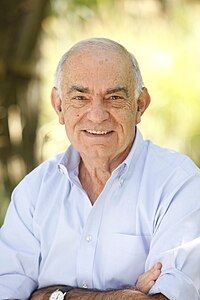
The Jewish Theological Seminary (JTS) is a Conservative Jewish education organization in New York City, New York. It is one of the academic and spiritual centers of Conservative Judaism and a center for academic scholarship in Jewish studies. The Jewish Theological Seminary Library is one of the most significant collections of Judaica in the world.

The Hebrew Union College – Jewish Institute of Religion is a Jewish seminary with three locations in the United States and one location in Jerusalem. It is the oldest extant Jewish seminary in the Americas and the main seminary for training rabbis, cantors, educators and communal workers in Reform Judaism. HUC-JIR has campuses in Cincinnati, Ohio, New York City, Los Angeles, and Jerusalem. The Jerusalem campus is the only seminary in Israel for training Reform Jewish clergy.
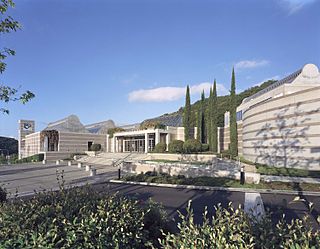
The Skirball Cultural Center, founded in 1996, is a Jewish educational institution in Los Angeles, California. The center, named after philanthropist couple Jack H. Skirball and Audrey Skirball-Kenis, has a museum with regularly changing exhibitions, film events, music and theater performances, comedy, family, literary, and cultural programs. The campus includes a museum, a performing arts center, conference halls, classrooms, libraries, courtyards, gardens, and a café. Although the center has its roots in Jewish culture, it is open to individuals of all ages and cultures.
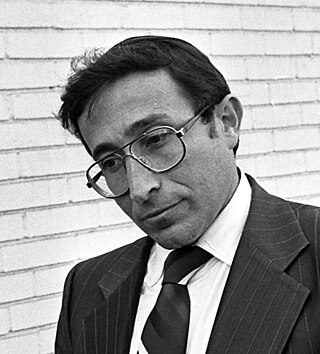
Marvin Hier is the dean and founder of the Simon Wiesenthal Center, its Museum of Tolerance and of Moriah, the center's film division. He has been a Track II diplomacy contributor to the genesis of the Abraham Accords.
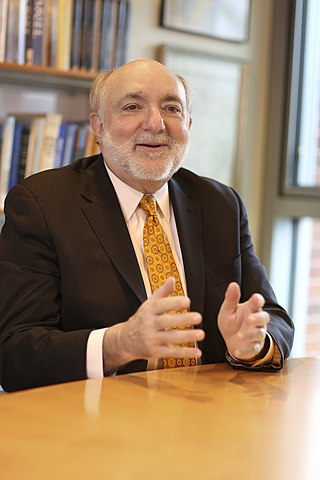
David Ellenson was an American rabbi and academic who was known as a leader of the Reform movement in Judaism. Ellenson was director of the Schusterman Center for Israel Studies and visiting professor of Near Eastern and Judaic studies at Brandeis University and previously president of the Hebrew Union College-Jewish Institute of Religion (HUC-JIR). He previously served as president of HUC-JIR from 2001 to December 31, 2013, and was later chancellor emeritus of that college until his death. Ellenson had served as interim president following the death of his successor, Aaron D. Panken until the inauguration of Andrew Rehfeld, the 10th and current President.
Rabbi David Eli Stern is the senior rabbi at Temple Emanu-El of Dallas, the largest synagogue in the South/Southwest United States and the third-largest in the Union for Reform Judaism. He was selected as the 26th most influential rabbi in America by Newsweek magazine in 2008 and the 30th most influential in 2009. Rabbi Stern graduated with high honors from Dartmouth College, earned his M. A. in Jewish education from the Rhea Hirsch School of Education at HUC-JIR Los Angeles, California in 1988, and was ordained from HUC in 1989.
Alfred Gottschalk was a German-born American rabbi who was a leader in the Reform Judaism movement, serving as head of the movement's Hebrew Union College-Jewish Institute of Religion (HUC) for 30 years, as president from 1971 to 1996, and then as chancellor until 2000. In that role, Rabbi Gottschalk oversaw the ordination of the first women to be ordained as rabbis in the United States and Israel, and he oversaw the development of new HUC campuses in Jerusalem, Los Angeles and New York City, three of the school's four campuses.
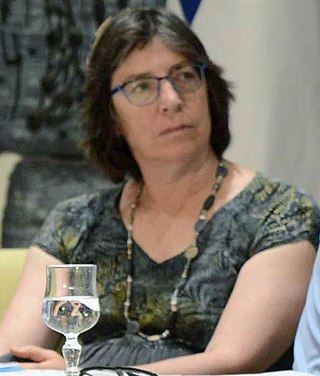
Naamah Kelman-Ezrachi is an American-born Reform rabbi who was named as Dean of the Hebrew Union College-Jewish Institute of Religion campus in Jerusalem starting in July 2009. In 1992, Kelman made history as the first woman in Israel to become a rabbi when she received her rabbinic ordination from Rabbi Alfred Gottschalk.
Stephen Wise Temple is a large Reform Jewish congregation in the Bel Air neighborhood of Los Angeles, California, in the United States. Founded in 1964 by the late Rabbi Isaiah Zeldin, with 35 families, the congregation grew rapidly. At various times in its history it has been stated to be the largest, or one of the largest, Jewish congregations in the world, at one time having a membership of approximately 3,000 families, six rabbis, two cantors and two cantorial interns, and four schools on three campuses. As of 1994, it was the second-largest synagogue in the United States. The congregation was founded as the Stephen S. Wise Temple, in honour of Stephen Samuel Wise; and 2014 it was renamed as the Stephen Wise Temple.
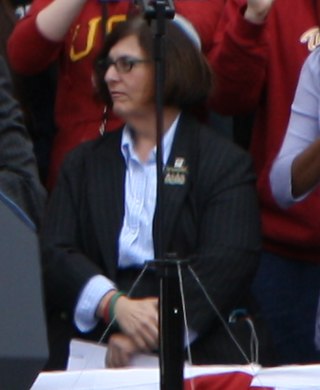
Denise Eger is an American Reform rabbi. In March 2015, she became president of the Central Conference of American Rabbis, the largest and oldest rabbinical organization in North America; she was the first openly gay person to hold that position.
Ezra Spicehandler was an American rabbi, writer, editor and educator specializing in modern Hebrew literature.

Lee Bycel is an American Reform rabbi, rabbinic educator and social activist. He served as dean of the Hebrew Union College-Jewish Institute of Religion in Los Angeles for 15 years, as western regional executive director of American Jewish World Service, and, in 2017, retired from Congregation Beth Shalom of the Napa Valley. He is an adjunct professor of Jewish Studies & Social Justice with the Swig Program in Jewish Studies and Social Justice at the University of San Francisco.
Jack H. Skirball was an American film producer, real estate developer, philanthropist and rabbi.
Steven Windmueller is an American scholar and Jewish communal professional. He is a professor emeritus at the Hebrew Union College-Jewish Institute of Religion in Los Angeles, CA where he teaches courses on contemporary political issues and American Jewish affairs. He is a fellow at the Jerusalem Center for Public Affairs, and a board member of the Jewish Federation and the Jewish Family Service of Los Angeles
William Mordecai Kramer was an American rabbi, university professor and art collector. He served as the rabbi of Temple Beth Emet in Burbank, California from 1965 to 1996. He was an associate professor of religious studies at the California State University, Northridge for two decades, where he established the Jewish Studies program.
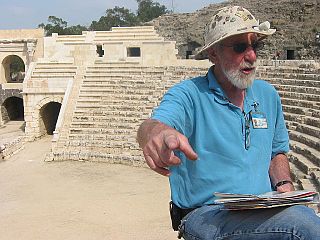
Walter Zanger, was an American-born Israeli author, tour guide and television personality. He was a contributor to newspapers, encyclopedias and magazines, and served as a member of the editorial board of the Jewish Bible Society.
Alfred Wolf (1915–2004) was a German-born American rabbi.
Ruth Weisberg is an American artist and Professor of Fine Arts at the University of Southern California, where she is also former dean of the USC Roski School of Art and Design. Weisberg's work is influenced by her Jewish heritage and its traditions, the human body, and feminist themes. She works primarily in painting, and her recent work is produced in scroll formats.

Isaiah Zeldin was an American rabbi. He was the founder of the Stephen Wise Temple, a Reform synagogue in Bel Air, Los Angeles, California.
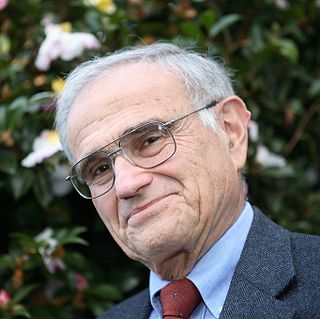
Michael Albert Meyer is a German-born American historian of modern Jewish history. He taught for over 50 years at the Hebrew Union College-Jewish Institute of Religion in Cincinnati, Ohio. He is currently the Adolph S. Ochs Emeritus Professor of Jewish History at that institution. He was one of the founders of the Association for Jewish Studies, and served as its president from 1978–80. He also served as International President of the Leo Baeck Institute from 1992–2013. He has published many books and articles, most notably on the history of German Jews, the origins and history of the Reform movement in Judaism, and Jewish people and faith confronting modernity. He is a three-time National Jewish Book Award winner.
